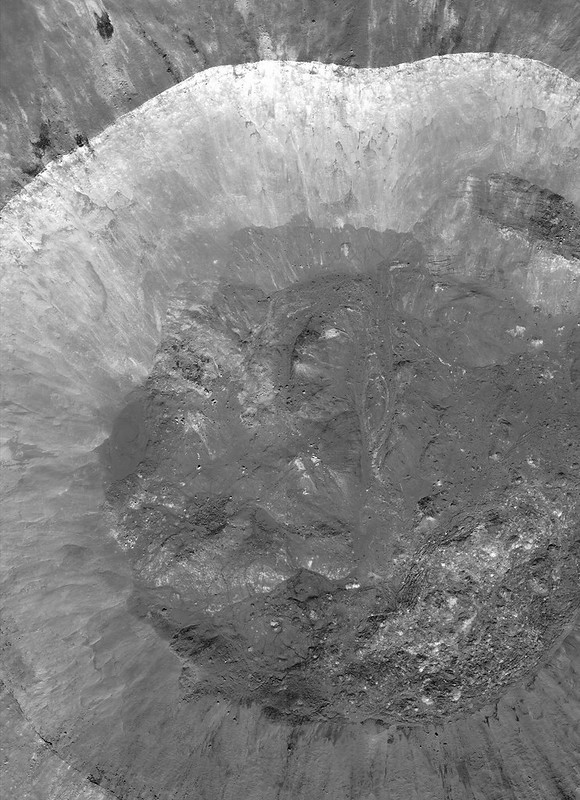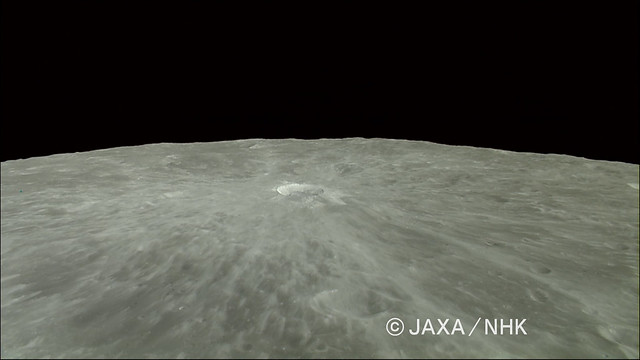 |
| Impact melt forms a swirled feature in Giordano Bruno crater. Field of view 1 kilometer. From LROC Narrow Angle Camera (NAC) observation M143947267L LRO orbit 6347, November 9, 2010; 53.08° angle of incidence, 57 centimeters per pixel resolution from 54.50 km [NASA/GSFC/Arizona State University]. |
Sarah Braden
LROC News System
The crater Giordano Bruno (22 km, 35.97°N, 102.89°E) is a favorite of lunar scientists due to its relatively young age and the amazing impact melt features found within and without the crater walls.
Previously, the LROC Featured Image gave a birds eye view of the whole crater in "Giordano Bruno, The Big Picture."
Today's Featured Image uses a 57 cm per pixel NAC frame to highlight the details of a giant swirl (or whorl) of impact melt within one of the larger impact melt pools inside Giordano Bruno.
The whorl formed in a clockwise direction and is about 1 kilometer in diameter. This spiral-shaped feature may have formed due to shear stress created when molten impact melt flowed at different speeds (probably caused by drag from the pool floor or an obstacle within the pool). This shear would modify flow directions in ways that could ultimately produce such a swirling pattern. Slumping material may have set the melt into motion within an otherwise calm impact melt pool.
The more information lunar scientists can gather about how quickly impact melt cools, the more we will know about how this structure formed!
Explore the entire NAC frame for more amazing views of Giordano Bruno, HERE.
Related Images:
Very Oblique View of Giordano Bruno
Sunset Over Giordano Bruno
Outside of Giordano Bruno
Fragmented Impact Melt
Impact Melt Flows on Giordano Bruno
LROC News System
The crater Giordano Bruno (22 km, 35.97°N, 102.89°E) is a favorite of lunar scientists due to its relatively young age and the amazing impact melt features found within and without the crater walls.
Previously, the LROC Featured Image gave a birds eye view of the whole crater in "Giordano Bruno, The Big Picture."
Today's Featured Image uses a 57 cm per pixel NAC frame to highlight the details of a giant swirl (or whorl) of impact melt within one of the larger impact melt pools inside Giordano Bruno.
 |
| Under a much higher Sun, a lower angle of incidence, the 'whorl' (left of center, at the contact between the west crater wall and floor) can also be seen in this mosaic showing nearly the entire complex melt flows and interior of Giordano Bruno. View the full resolution (9587x13223) mosaic, HERE. LROC NAC mosaic M1102880536LR, orbit 14851, September 21, 2012; 37.55° angle of incidence, resolution 1.52 meters from 152.11 km [NASA/GSFC/Arizona State University]. |
 |
| Giordano Bruno from south, looking ahead from Japan's Kaguya (SELENE-1) in polar orbit (2008), from roughly 100 km over the 102nd meridian. The crater is closely studied because it is strikingly fresh, perhaps less than 10 million years old and far less affected by the steady gardening of micrometeorites and the steady rain of energetic cosmic rays that turn over the top 3 mm of the Moon's surface every 2 million years [JAXA/NHK/SELENE]. View the full 1920x1200 original, HERE. |
Explore the entire NAC frame for more amazing views of Giordano Bruno, HERE.
Related Images:
Very Oblique View of Giordano Bruno
Sunset Over Giordano Bruno
Outside of Giordano Bruno
Fragmented Impact Melt
Impact Melt Flows on Giordano Bruno


1 comment:
Just a thought: On Earth since the minimum impact speed would be 7ml/s 25,200mph a meteor of about 1/2 mile 0.6km might make a creator 13.6 miles diameter. On the moon the minimum speed is about 5,500mph about 0.75 to 1ml/s would have to be maybe 3 miles in diameter that should be visible for at least 24hrs. It would show as discribed a blast and darking, which has been seen before. Depending on the angle and speed of the ejecta, it could reach both the moon and Earths escape velocity with very little or no meteor showers.
Post a Comment